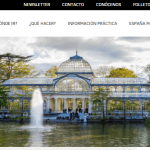Today the minister for Industry, Trade and Tourism, Reyes Maroto, led the Executive Committee of the Smart Destinations Network, presenting the main actions in the Tourism Recovery Plan which the Ministry is working on to alleviate the impact of COVID-19 on the sector.
“The role of municipalities is essential to promoting and guaranteeing smart, safe tourism, and will play an important role in the relaunching of this sector, key both for its contribution to the economy and to social and territorial unity,” noted Reyes Maroto in her presentation.
The minister announced the creation of a new knowledge model to give municipalities the elements needed to assist in decision making on tourist policies: “We want to be more familiar with the characteristics of the production network that comprises the Spanish offer and to identify social trends that affect travellers’ behaviour to be able to predict changes in demand.”
Sixteen new destinations incorporated
The Executive Committee has approved the addition of 16 new destinations, taking the total number of Network members to 121 (88 destinations, 16 institutions and 16 collaborating companies).
The destinations to have been added to the Network today are: the local governments of Badajoz, Burgos, Cangas de Onís, Cullera, El Campello, Gijón, Guadalajara, Puebla de Sanabria, Puerto del Rosario, Rota, Vitoria-Gasteiz, Bollullos de la Mitación, Ciudad Real, Lugo, Campo de Gibraltar and Canal de Navarrés.
In attendance at today’s remote meeting were the Secretary of State for Tourism, Isabel Oliver; the Chairman of SEGITTUR, Enrique Martínez; the director-general of Red.es, David Cierco; and the secretary-general of the Spanish Federation of Municipalities (FEMP), Carlos Daniel Casares.
Smart Destinations Network actions
Enrique Martínez explained how, as a result of the COVID-19 crisis, they were working to improve and adapt the Smart Destination diagnosis methodology and the recommendations in the Action Plan, aiming to incorporate issues linked to the supervening situation, such as future actions in communication, marketing repositioning and support to employment.
Moreover, a training and education plan is being designed for members, focusing on digital tools, hygiene matters, segment analysis and analytical skills, which will reinforce skills for the post-COVID era. Over the last few weeks, a COVID-19 Smart Destinations Network channel has been created on Padlet to share information and best practices and has organised webinars and tutorials, among other actions.
About the Smart Destinations Network
The Smart Destinations Network, which was created on 27 February 2019, aims to promote a new frame of reference to consolidate the competitiveness of the Spanish tourism model. The Executive Committee is led by the Secretary of State for Tourism and has three Vice Chairs: one organisational position (the Chairman of SEGITTUR) and two institutional positions (FEMP and Red.es), as well as eight representatives from eight destinations (Benidorm, Calvià, Pontevedra, Arona, Palencia, Avilés, San Bartolomé de Tirajana and San Sebastián).
Information about the Network: https://www.destinosinteligentes.es/





